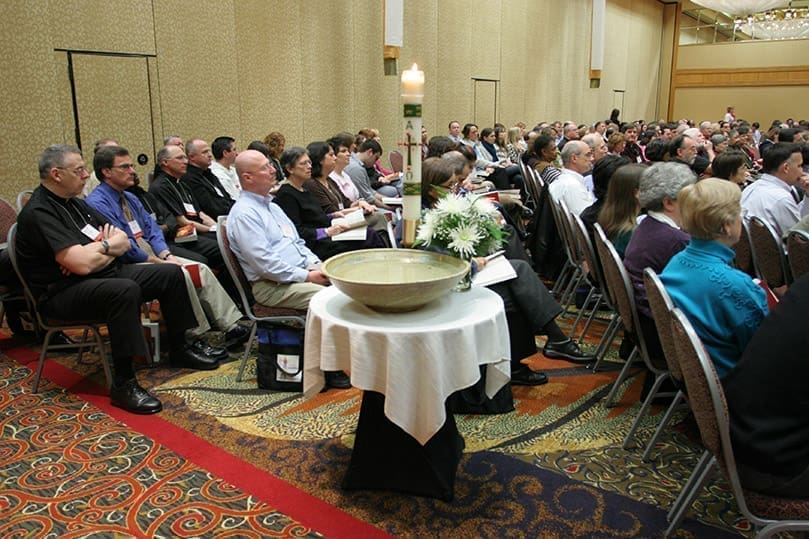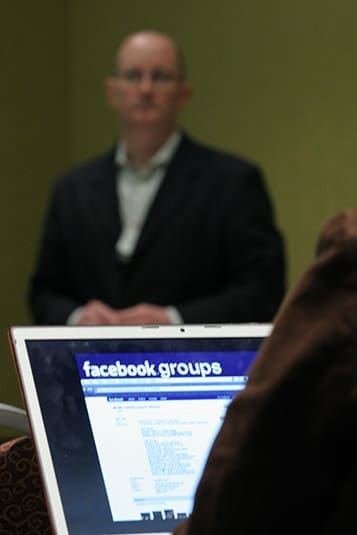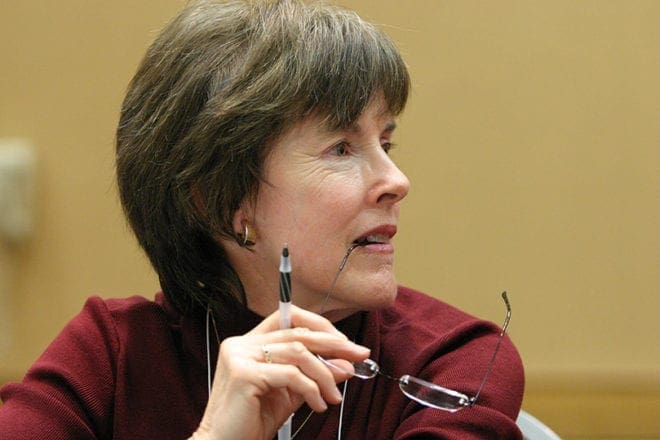 Photo By Michael Alexander
Photo By Michael AlexanderAtlanta
Campus Ministers Go Virtual To Draw Students
By ANDREW NELSON, Staff Writer | Published January 15, 2009
Today’s college students are always plugged into technology, don’t carry the do-not-trust-anyone-over-30 hang-up and are not afraid to share details of their lives. But the idea of going out on a romantic date causes panic.
So, how’s a Catholic campus minister supposed to engage them with the challenges of Jesus?
Being where they are, advise speakers at a national campus ministry convention.
Students like technology. Start a Facebook page.
Students like to talk. Ask probing questions.
Students are immersed in pop culture. Find the Gospel in today’s media.

Holy Cross Father Peter Walsh, assistant chaplain at Saint Thomas More, the Catholic Chapel and Center at Yale University, New Haven, Conn., co-facilitates a workshop entitled “Integrating Technology In Ministry” with fellow assistant chaplain Katie Byrnes. Photo By Michael Alexander
Meeting Jan. 6-9 in Atlanta, close to 300 lay ministers, sisters and priests focused on how to take Jesus’ message to students who grew up with the Internet and have a worldview shaped by the terrorist attacks of Sept. 11.
Technology and college life today are tied together. And campus ministers have to utilize the tool.
Holy Cross Father Peter Walsh said a Web presence is almost mandatory, whether a Web page or being on the popular social networking group Facebook.
“It is kind of like having the church in the public square. Their faith is represented on the large public square,” said Father Walsh. “Students are online. You should be there.”
Walsh and his colleague Kathleen Byrnes, a campus minister, work at the St. Thomas More Catholic Chapel and Center at Yale University in New Haven, Conn.
They have several hundred students linked on their Facebook group. It allows them to communicate with people and also be easily available to students.
However, Byrnes said the technology is a tool that should at times be shut off. If a student e-mails a serious question, the minister engages the student but invites them to a face-to-face conversation, she said.
Technology can also be a crutch to hide isolation in a dorm. The campus minster can challenge students to have a “technology fast.” Byrnes said students on retreats are told to leave behind cell phones. Being unhooked from technology is unusual for them and it allows them to focus, she said.
The Catholic Campus Ministry Association celebrated its 40th anniversary with the national three-day convention. Its theme was “Jesus in a New Generation” as workshops covered topics from “Christ Came to Heal,” focused on the mentally ill student, to “What’s Faith Got to Do With It” about the environment.
The Atlanta Archdiocese was represented. Father Bryan Small, the director of the University Catholic Center, a parish for students at Emory University and Agnes Scott College, presented the “Turning Water Into Funk” workshop on evangelization and pop culture. Father Edward Branch, chaplain at the Lyke House at the Atlanta University Center, led a discussion on building stronger connections between Catholic campus ministers at historically black colleges and universities.
Father Martin Moran, the executive director of the Cincinnati-based Catholic Campus Ministry Association, said campus ministers serve nearly 5 million students.
In today’s students, they face a skeptical group that is interested in the spiritual aspects of religion, but suspect of the church.
“They don’t buy into the institutional church,” said Father Moran, the chaplain at Bucknell University in Lewisburg, Pa., for nine years. The challenge is to link students’ desire to serve and the church, he said.
“We have to constantly invite people back to the faith,” he said.
At the event, Bishop Gregory M. Aymond of Austin, Texas, was given the 2008 Exemplary Bishop Award for leadership in campus ministry.

Mary Kruer, assistant university minister at the University of San Diego, listens as someone makes a comment following a keynote address. One of Kruer’s roles calls for serving as the university ministry team’s liturgy coordinator. Photo By Michael Alexander
Loneliness on campus can bring students to tears even as the technology links to people around the globe.
Boston College philosophy professor Kerry Cronin said students are quick to share their lives, including intimate stories. The students are waiting for a mentor to take an interest in what they do because the culture “is offering them a whole lot of nothing,” she said during her keynote speech.
Students do not need to be preached at or be quoted the great works of ethics, she said. What they want are insightful questions that ask about their desires.
“You have to be hitting them where they are,” she said.
Cronin said she realized the need for these discussions after a Jesuit priest spoke at a talk titled “Chastity and Courage.” The lecture hall was packed, she said. She then gave a talk called “Take Back the Date” where students also jammed the room. As part of her classes, a student is required to ask a person out on a “level one” date, maybe for ice cream or coffee.
A minister has to “force the awkwardness” by asking a few questions and then listen, she said.
“They want to talk about why they are so lonely,” she said.
On the small group discussion about Catholic ministry on historically black colleges, the tasks ranged from being of service to students, evangelizing people about the faith and offering Mass and sacraments.
Three priests talked about establishing programs on campuses in Mississippi and in North Carolina to aid students in places that weren’t familiar with the church.

Father Edward Branch, standing, campus minister at Lyke House, the Catholic Center at Atlanta University, leads a workshop on ministry at Historically Black Colleges and Universities. Photo By Michael Alexander
“It’s a new venture,” said Franciscan Father Greg Plata.
Father Branch said, “We need to make ourselves as large as we truly are and larger.”
Mary Kruer is an assistant university minister at the Catholic University of San Diego. She is unfamiliar with the latest technology, so she scribbled to fill a notebook with information about the Internet during the technology workshop.
After 13 years in the field, Kruer said she has found students more technology savvy, but also isolated by it. They are searching for community beyond the online experience, she said.
“There is a generosity of spirit,” she said, even as many today are “spiritual, but question religiosity,” she said.
Christa Angeloni said she planned to return to her campus at Cabrini College, outside Philadelphia, with new ideas to connect with students. Angeloni said she wants to work on getting students to relate to the humanity of Jesus.
“They’ll connect to Jesus the person, not overly focused on the divine, but the face of Jesus,” she said.